Five exceptional ways to live 'Ordinary Time'

A young man is pictured in a file photo praying during a novena at The Catholic University of America in Washington. Praying a novena is a good way to stay connected with the church during Ordinary Time. (OSV News photo/CNS File, Rafael Crisostomo, El Pregonero)
(OSV News) — Advent has its wreath, its candles, its hymns — all of which culminate in Christmas. Lent has ashes, fasting, Stations of the Cross — and the Resurrection. It’s easy to be energized and excited about the faith during the High Holy Days. But Ordinary Time in the Catholic Church? It’s just so, well, ordinary.
How do you stay involved and engaged when Sundays seem to run together and the next liturgical high point is weeks or months away?
There are, of course, the standard suggestions: attend daily Mass, say the Rosary, make more frequent confessions. They are good ideas and can certainly help with a lagging faith, but many of us either already do these things or have done so in the past. What we long for is an infusion of ideas that are both a little different and yet still deeply rooted in our traditions.
So here are five suggestions to help make Ordinary Time a little less ordinary.
1. Pray a novena
A novena, nine days of private or public prayer intended to obtain a special grace, favor or blessing has long been a part of the church’s devotions. You can find novenas for everything from world peace to healing, most of which are directed to end on a particular feast day of Mary, Jesus, or a prominent saint. Sometimes non-Catholics, and even a few Catholics, may ask, “Why should we pray novenas?” The short answer is simply that Jesus Christ calls us to pray. In fact, He tells us to “pray always without becoming weary” (Lk 18:1), to pray with persistence. We’ll never go wrong when we obey Christ. He promises that prayer works, and He often responds with electrifying results. Make your Ordinary Time extraordinary by praying one (or more!) novenas.
2. Keep a gratitude journal
Some scientific studies have shown that people who regularly “count their blessings” are happier than those who don’t. Often we are so focused on the negatives in our lives we overlook the positives. So, during Ordinary Time, take a small notebook and, once a day, write at least five things you are thankful for. They don’t have to be earth-shattering; “a cup of coffee” will suffice. Then, on Sunday, read aloud your list, saying before each item: “God, I thank you for…” It seems like a simple activity, but it can literally be life changing as a concrete, permanent record of the blessings of your life that is hard to overlook even when you are feeling down.
3. Act out
One reason our faith can become stale is when it becomes too cerebral. Instead of “doing,” we spend most of our time “thinking.” So put your faith in action. No, that doesn’t mean you have to start vigils at abortion centers or volunteer at soup kitchens — although those things are good and may be just what some people need. You can act out your faith in smaller, more homey ways as well. For instance, Jesus told us if we had two coats, we should share with those who had none. Most of us probably have at least two coats in our closets, so paring down our clothes could be a great place to begin. During Ordinary Time, simplifying, eliminating, and giving away those things that we no longer use can become a great act of faith … and a great faith-builder.
4. Read something with moral value
Have you ever read “Confessions” by St. Augustine of Hippo? “Introduction to the Devout Life” by St. Francis de Sales? “The Brothers Karamazov” by Fyodor Dostoevsky? Or for more modern tastes: “Mr. Blue” by Myles Connolly, “In This House of Brede” by Rumer Godden or even “The Shack” by William P. Young? In the weeks when the Church is not preparing for something special, we have the time to read what others have written about God, faith, and the meaning of life. We don’t have to agree with everything we read, but reading morally engaging literature is one of the best ways to keep our faith vital and vibrant.
5. Keep the Sabbath
The weeks of Ordinary Time are ideally suited to creating family rituals that keep the Sabbath as a special day. Without the pressure of holidays and holy days, we can design our own personal practices that make Sunday a day to anticipate. As with most things, these don’t have to be elaborate. Perhaps stopping at the doughnut shop on the way home from Mass and letting everyone pick their favorite could become a tradition. Or reinstitute a sit-down family dinner Sunday evening, even if you are sitting down to eat take-out. Or read aloud or listen to an audiobook. Just find something you and your family can enjoy and save that activity for the Sabbath.
Ordinary Time is only ordinary if we think of it that way. If we consider these weeks, not as the long boring stretches between the good stuff, but as a time to try new things and refocus our energies on our spiritual growth, Ordinary Time can become one of our favorite — and most rewarding — times of year.
by Woodeene Koenig-Bricker, an author and editor from Oregon. She was the editor of Catholic Parent magazine from its inception and has written extensively on spirituality, especially saints. Her latest book is Dinner Party with the Saints from Paraclete Press.
